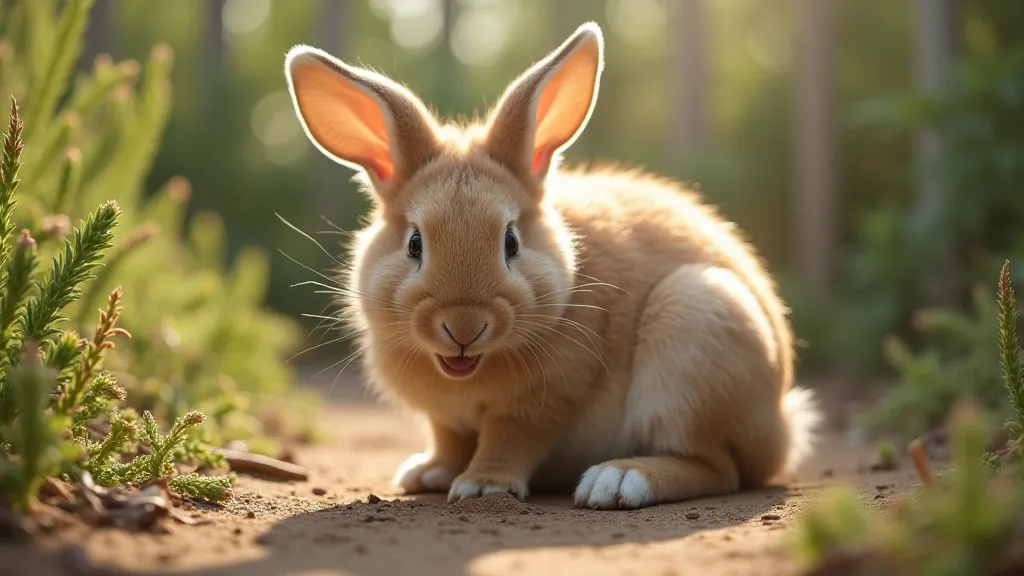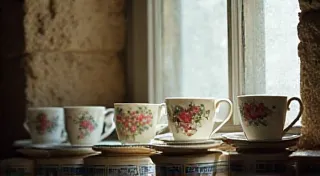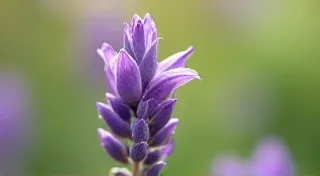Rabbits and the Silvered Stream: A Quiet Ritual of Renewal
There’s a certain stillness that settles over a rabbit’s world. It's not a lack of activity, certainly. A flurry of nose-twitches, a rhythmic thump of hind feet, the constant nibbling – all signs of life. But beneath that, a quietude exists, a delicate balance of nervous energy and profound peace. I’m reminded of antique accordions, these intricate instruments, once pulsating with joyous music, now often silent, requiring a gentle touch to awaken them. They, too, possess a stillness, a history etched into their bellows and keys, waiting to be rediscovered.
For years, I've been captivated by the possibility of offering my rabbits more than just a diet of hay and pellets. I wanted to nurture their emotional and digestive well-being in a holistic way – a way that acknowledged their inherent sensitivities and the ancestral wisdom embedded within the natural world. That’s when I began exploring the tradition of herbal remedies, specifically tailored tea blends, recognizing that a simple cup of carefully selected herbs could be a powerful tool.

The Quiet Language of Herbs
Rabbits, unlike dogs or cats, don’t readily demonstrate discomfort. Their resilience and natural stoicism often mask underlying stress or digestive issues. A subtle change in appetite, a slight decrease in activity, or even a slight alteration in their pooping habits – these are the whispers we must learn to interpret. Herbs offer a gentle, non-invasive way to address these subtle imbalances. They work *with* the rabbit’s system, rather than against it, encouraging self-healing and restoring equilibrium.
The historical use of herbs for rabbits isn’t widely documented in the same way it is for humans. However, observing rabbit behavior in natural settings – their instinctive selection of certain plants to nibble upon – offers a strong indication of their inherent knowledge of herbal benefits. They intuitively choose plants that soothe upset stomachs, reduce inflammation, or provide essential nutrients. We, as responsible keepers, can simply mimic that intuition, selecting herbs with similar properties and offering them in a palatable, easy-to-digest form: a gentle tea. Some might be intimidated by the prospect of blending herbs safely for pets. Luckily, there’s a wealth of information on the Herbal Alchemist's Primer: A Journey into Safe Blending to ease you into the process. Understanding the underlying principles is key to both safety and effectiveness.
Herbs for Serenity and Digestive Ease
Let’s consider some herbs particularly suited to rabbits, always with the understanding that moderation and careful observation are crucial. Chamomile, a classic for relaxation, can help alleviate anxiety and promote restful sleep. A very small amount, steeped in warm water, can be offered in a sipper bottle. Peppermint, renowned for its digestive properties, can ease bloating and indigestion. Again, a tiny amount is key; rabbits can be sensitive to strong flavors. In some cases, digestive issues can stem from deeper concerns like colic, especially in young animals. Exploring solutions like the Gentle Bloom: Soothing Colic in Young Pets Through Herbal Support might be beneficial if you're facing this challenge.
Dandelion leaf, often dismissed as a weed, is a nutritional powerhouse, rich in vitamins and minerals. It’s a gentle diuretic and can support kidney function. Nettle, another common weed, is another excellent source of vitamins and minerals and can help with overall health. Lemon balm, with its citrusy aroma, can help calm nervous energy and may even help with mild aggression (though addressing the underlying cause of aggression is always the priority).
Remember, the key isn't to overwhelm the rabbit’s system. A single herb, used sparingly, is often more effective than a complex blend. Introduce new herbs gradually, one at a time, to observe any reactions. Observe their water intake; some herbs can have a mild diuretic effect. Always ensure fresh, clean water is readily available.
Craftsmanship and the Careful Brew
The process of preparing tea blends for rabbits mirrors the care taken in restoring an antique accordion. It's about understanding the material, respecting its history, and working with precision. Just as a skilled accordion restorer meticulously cleans and repairs delicate components, we must carefully select and prepare the herbs.

The quality of the herbs matters. Organic, pesticide-free herbs are always preferable. Gently rinse the herbs before steeping, and use warm (not boiling) water. Steep for only a few minutes, then strain the tea. The resulting liquid should be a pale green or yellow color. Serve in a small sipper bottle or shallow dish.
Beyond understanding the specific properties of each herb, cultivating a mindful approach to the blending process is key. Many find the process rewarding, not just for the animal’s health, but also as a grounding and meditative practice. Thinking about the holistic well-being of your pet goes beyond just providing food and shelter; it’s about creating a nurturing environment that addresses their physical, emotional, and even spiritual needs. This deeper understanding can even extend to other areas of animal care, for instance, helping them manage allergies – as outlined in The Canine Compass: Navigating Allergies Through Herbal Infusion. While that article focuses on dogs, many of the principles are universal across species.
A Deeper Connection: Cultivating an Herbal Garden
While sourcing high-quality herbs from reputable suppliers is essential, many dedicated rabbit keepers also choose to cultivate their own herb gardens. This not only provides a constant supply of fresh, organic herbs but also fosters a deeper connection with nature and provides a unique learning experience. Planning and tending an herbal garden can be incredibly fulfilling, and provides a constant reminder of the bounty and generosity of the natural world. If you're interested in building your own source of rabbit-safe herbs, consider exploring The Seed of Renewal: Germinating an Herbal Garden for Your Pet's Wellness, which offers valuable insights into creating a thriving and beneficial garden for your animal companions.
A Gentle Reminder: Safety First
This is absolutely crucial: Some herbs are toxic to rabbits. Never administer any herb without thorough research. Avoid herbs like lavender, eucalyptus, and parsley (in large quantities). Always consult with a veterinarian experienced in rabbit care before introducing new herbs into your rabbit’s diet. This article is for informational purposes only and should not be considered veterinary advice.
Moreover, the principle of “less is more” applies here. Overdoing even safe herbs can lead to digestive upset. Start with the smallest possible amount and gradually increase as needed, always observing for any adverse reactions.
The Quiet Ritual
Preparing and offering tea blends for rabbits isn’t just about providing a health benefit; it's about creating a ritual of care. It’s a moment to slow down, to observe, and to connect with these gentle creatures. Watching a rabbit delicately sip a warm cup of carefully selected herbs, witnessing a subtle relaxation in their posture, can be profoundly rewarding. It's a quiet affirmation of the power of nature, the beauty of craftsmanship, and the enduring bond between humans and the animals we cherish. It’s a silvered stream of renewal, flowing gently through a rabbit’s peaceful world.






